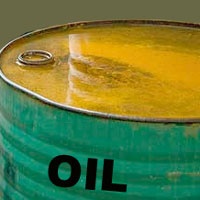OPEC oil cut fails to raise crude prices
24 Oct 2008
After days of posturing, the Organization of Petroleum Exporting Countries has finally decided to cut oil production. However, the quantum of the cut was not sufficient to stem the decline in oil prices, which, at $63.05 fell to their lowest levels in 17 months even as the 11-member oil cartel decided to slash daily production by about 5 per cent from 28.8 million barrels to 27.3 million barrels per day.
 OPEC decided to lower supply by 1.5 million barrels a day from November, oil ministers said today at the end of a meeting at the group's Vienna's headquarters. Although prices had momentarily risen on the news of this emergency meeting, the smaller-than-expected cut sent crude prices further down. After the decision was announced, crude traded 7.1 per cent lower at $63.05 a barrel on the New York Mercantile Exchange. (See: Oil gains as OPEC weighs output cut)
OPEC decided to lower supply by 1.5 million barrels a day from November, oil ministers said today at the end of a meeting at the group's Vienna's headquarters. Although prices had momentarily risen on the news of this emergency meeting, the smaller-than-expected cut sent crude prices further down. After the decision was announced, crude traded 7.1 per cent lower at $63.05 a barrel on the New York Mercantile Exchange. (See: Oil gains as OPEC weighs output cut)
"This slowdown in oil demand is serving to exacerbate the situation in a market which has been over-supplied with crude for some time, an observation which the organisation has been making since earlier this year. Moreover, forecasts indicate that the fall in demand will deepen, despite the approach of winter in the northern hemisphere," OPEC said in a statement.
''Demand is significantly less than what is being supplied, that is the reason the cut was taken,'' Saudi Arabian oil minister Ali al-Naimi said after the meeting. Crude oil has tumbled 57 per cent from an 11 July record of $147.27 a barrel as the financial market crisis spreads, job cuts increase and fuel consumption slows.
OPEC president and Algerian Oil Minister Chakib Khelil said at a news conference that the cut would be ''100 percent effective'' in stabilizing prices. Last weekend, he had said that any production cut could be "substantial," adding that the organization would try to stabilise prices between $70 and $90 a barrel.
Saudi Arabia, the group's largest producer, will reduce its output target by 466,000 barrels a day. Iran, the second biggest, will cut 199,000 barrels, OPEC said in a statement. Kuwait's share of the reduction will be 132,000 barrels, the United Arab Emirates 134,000 barrels and Venezuela 129,000 barrels.
The last time OPEC decided to slash official quotas was at a December 2006 meeting in Abuja, Nigeria. The 500,000 barrel-a-day cut took effect in February 2007, expanding an earlier reduction agreed in October. The cuts were reversed later in 2007 as oil prices rallied.
Though OPEC said it would revisit the cuts in its next meeting on 17 December, analysts believe it will be hard to convince the oil producing nations to further slash production. Saudi Arabia, which took the brunt of this round of reductions, is especially averse to any more cuts in the near future.



















